Now Reading: Fierce Loyalty: Nita Ambani’s Public Encounter And The Enduring Rohit Sharma Captaincy Debate in IPL 2025
-
01
Fierce Loyalty: Nita Ambani’s Public Encounter And The Enduring Rohit Sharma Captaincy Debate in IPL 2025
Fierce Loyalty: Nita Ambani’s Public Encounter And The Enduring Rohit Sharma Captaincy Debate in IPL 2025
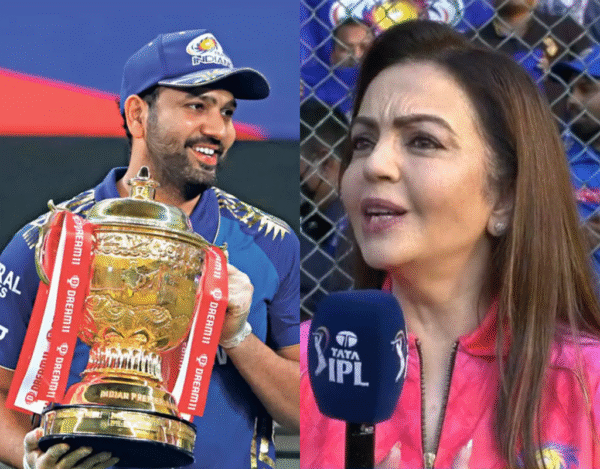
The Indian Premier League (IPL) is more than just a cricket tournament; it’s a fervent religion for millions, where star players are deified and team loyalties run as deep as family ties.
Against this backdrop of unparalleled passion, a poignant moment unfolded during the recently concluded IPL 2025 season, capturing the raw emotion that often transcends the boundaries of the sporting arena.
As Mumbai Indians owner Nita Ambani exited the revered Shirdi Sai Baba Temple in Nashik, a devout cricket fan approached her with folded hands, uttering a plea that resonated with the sentiments of countless Mumbai Indians faithful: “Rohit Sharma ko captain Karo/banao” (Make Rohit Sharma the captain again).
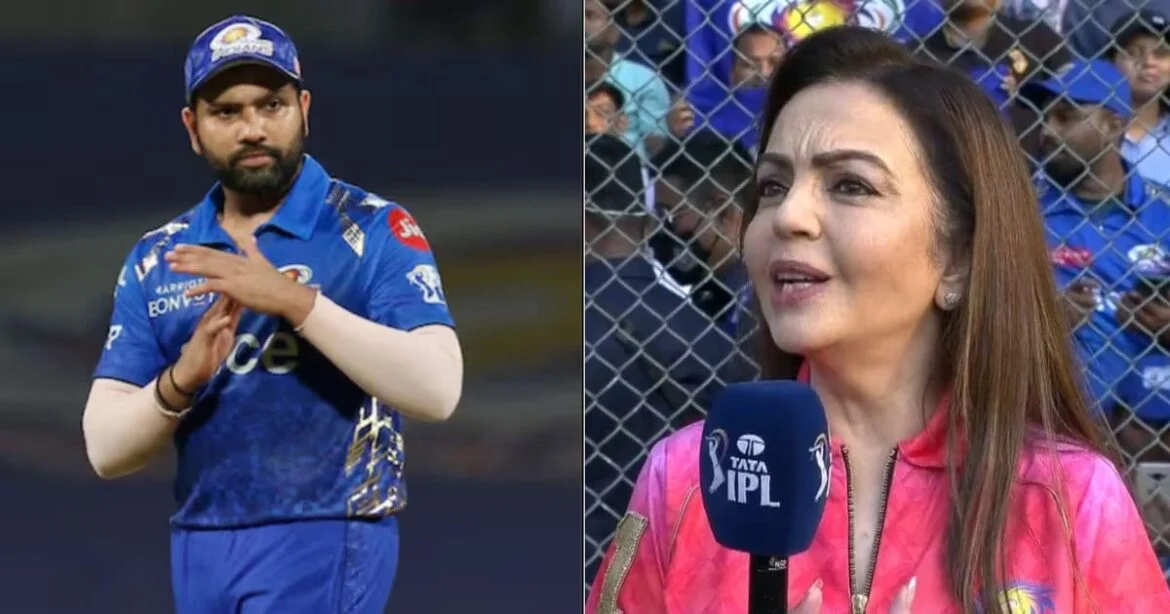
Nita Ambani’s response, a simple yet profound, “Baba ki marzi” (Sai Baba’s wish), immediately went viral, becoming a defining soundbite of the season.
This seemingly innocuous interaction laid bare the deep-seated emotional investment of fans in their beloved teams and, more specifically, the lingering complexities surrounding the leadership transition within the Nita’s Mumbai Indians, a saga that played out conspicuously throughout a challenging IPL 2025 season.
This article delves into the incident, its layers of meaning, and the broader implications for franchise management, player legacies, and the unparalleled fan culture that defines Indian cricket.
The Shirdi Incident: A Microcosm of Fan Devotion
The visual of a fan approaching a high-profile team owner at a spiritual sanctuary speaks volumes about the unique connection between Indian cricket enthusiasts and their icons. Shirdi, a place of immense religious significance, is where devotees seek divine intervention and solace.
For a fan to bring a cricketing concern – particularly one as emotionally charged as Rohit Sharma’s captaincy – to such a sacred space, highlights the profound way in which cricket intertwines with daily life and personal beliefs in India.
The video, which quickly circulated across social media platforms like Twitter (now X), showed the fan’s earnestness as he requested Nita Ambani to make Rohit captain again.
His folded hands and direct appeal were not born of malice or aggression, but of a heartfelt desire to see his beloved captain restored to a position he believed was rightfully his.
This wasn’t merely a plea for a tactical change; it was an emotional appeal rooted in a deep sense of loyalty and a yearning for what many fans perceived as a return to a golden era for the Mumbai Indians.
The fan’s act, while perhaps seen as ‘madness’ by some onlookers, was, in fact, a testament to the unparalleled passion that fuels the IPL, where fans often feel a personal stake in the team’s fortunes and strategic decisions.
Nita Ambani’s ‘Baba Ki Marzi’: A Response Steeped in Wisdom and Cultural Nuance

Nita Ambani’s reply, “Baba ki marzi,” was far more than a polite dismissal.
Man was demanding captaincy for Rohit Sharma in front of Nita Ambani. This is madness.💀 pic.twitter.com/dCbdVuQZJu
— Gems of Cricket (@GemsOfCrickets) April 13, 2025
It was a culturally resonant statement, deferring to divine will, which in India, is often invoked to acknowledge circumstances beyond human control or to express acceptance of a higher plan. In the context of the contentious captaincy change, Nita’s response served several purposes:
- De-escalation: It offered a calm, spiritual perspective to a highly emotional issue, deflecting direct blame or detailed explanation.
- Cultural Connection: It instantly resonated with the vast Indian audience, many of whom share similar spiritual beliefs, making her response relatable and understandable on a deeper level.
- Strategic Ambiguity: While seemingly philosophical, it avoided committing to any future action or directly engaging in the debate, allowing the franchise to maintain its public stance.
- Acknowledgement: Despite its brevity, it acknowledged the fan’s plea without validating or dismissing it entirely, showing a degree of empathy.
For many, Nita Ambani’s phrase epitomized the philosophical approach required to navigate the tumultuous waters of fan sentiment in a league where emotions run high. It implicitly suggested that some decisions, however controversial, are part of a larger unfolding plan, perhaps even one dictated by destiny.
Rohit Sharma’s Unparalleled Legacy: The ‘Hitman’ and His Five Stars
To understand the intensity of the fan’s plea, one must grasp the immense legacy Rohit Sharma has forged with the Mumbai Indians. After joining the franchise in 2011 from the Deccan Chargers, his appointment as captain in 2013 marked a watershed moment.
Under his astute leadership, Nita Ambani’s MI transformed into the most dominant force in IPL history, securing a staggering five championship victories in 2013, 2015, 2017, 2019, and 2020.
Rohit’s captaincy was characterized by calm demeanor under pressure, sharp tactical acumen, and an uncanny ability to bring out the best in his players.
He wasn’t just a captain; he was the face of the franchise’s golden era, a symbol of its unparalleled success, and a figure who commanded loyalty not just from the team, but from millions of fans globally.
His bond with the “MI Paltan” (MI Army) transcended ordinary team loyalty; it was an emotional covenant built on years of shared triumphs and an intrinsic understanding of the team’s ethos.
The abrupt captaincy change ahead of IPL 2024 (and thus preceding IPL 2025) felt, to many, like a betrayal of this deep-rooted connection, leaving a void that Hardik Pandya was inevitably tasked with filling. Fans were disappointed with the whole management and raised questions on Nita Ambani and others
The Hardik Pandya Transition: Navigating the Tides of Fan Discontent
The decision to replace Rohit Sharma with Hardik Pandya was a bold and controversial move by the Mumbai Indians management and questions were raised on Nita Ambani and other owners.
While Pandya is a dynamic all-rounder with proven leadership credentials (having led Gujarat Titans to an IPL title), stepping into Rohit’s shoes was always going to be an uphill battle.
The initial phase of his captaincy, particularly during IPL 2024, was fraught with visible resistance from sections of the Mumbai Indians fanbase. Booing from the stands, critical social media campaigns, and a general air of disapproval followed Pandya wherever he played.
However, the narrative surrounding Hardik has gradually evolved. His instrumental performances, particularly in India’s recent ICC T20 World Cup and Champions Trophy victories (where he played crucial roles, with the latter coming under Rohit’s national team captaincy), have showcased his growing maturity and match-winning capabilities.
These national successes, while distinct from his franchise role, slowly began to shift some fan perceptions, leading to a grudging acceptance among a segment of the MI loyalists. Yet, as the IPL 2025 season demonstrated, the emotional attachment to Rohit as MI captain remained fiercely strong.
Nita Ambani’s Mumbai Indians’ IPL 2025 Performance: A Season of Unsettled Waters
The performance of Mumbai Indians in IPL 2025 only served to amplify the debate surrounding the captaincy. As the fan’s plea to Nita Ambani surfaced in April 2025, MI’s journey in the tournament was marked by inconsistency and struggles.
With a record of just two wins from six matches at that point, including three losses directly under Hardik Pandya’s leadership (he was banned for the season opener, a match they also lost), the team found itself in a precarious seventh place on the IPL points table.
This middling performance fueled the speculation and intense public debate. Critics and pundits questioned the leadership transition’s timing and impact.
Was the team’s unsettled performance a direct consequence of the captaincy change, or were there deeper structural issues at play?
Every loss reignited the ‘Rohit for captain’ chants, making Hardik Pandya’s role increasingly challenging. The pressure on him was immense, a psychological battle fought not just on the field, but also in the court of public opinion.
Significant matches from that phase of IPL 2025 included:
- Their opening loss (where Hardik was banned).
- A narrow win against Delhi Capitals (where Rohit’s tactical input was noted).
- Struggles against formidable opponents like Sunrisers Hyderabad and Chennai Super Kings, which saw them drop down the table.
This period underscored that team performance, fan sentiment, and leadership decisions are intricately linked in the high-stakes environment of the IPL.
Rohit’s Unseen Influence: The Uncrowned Tactician
Despite no longer holding the captain’s armband for Nita’s MI, Rohit Sharma’s strategic acumen and leadership presence remained palpable on the field throughout IPL 2025.
Cricket experts and observant fans consistently noted his continued involvement in key decisions.
A prime example, as highlighted in the original article, was during Mumbai’s crucial 12-run victory over Delhi Capitals at the Arun Jaitley Stadium. Observers praised Rohit for his spontaneous suggestion to change the ball and introduce Karn Sharma as an “impact player.”
These were not just suggestions from a senior player; they were tactical masterstrokes that proved crucial to the team’s narrow win, underscoring that his cricketing brain continued to operate at the highest level, regardless of his official designation.
This dual dynamic – Hardik as official captain, Rohit as influential senior player – added another layer of complexity to the team’s chemistry.
While Hardik had the ultimate authority, Rohit’s presence and strategic insights undoubtedly influenced on-field decisions, creating a unique leadership ecosystem that fascinated analysts and fans alike.
The Pulse of Indian Cricket: Fan Passion Meets Franchise Pragmatism
The entire saga, from the fan’s plea to Nita at Shirdi to the ongoing captaincy debate, vividly illustrates the multifaceted dynamics of sports leadership transitions, particularly in a nation where cricket is intertwined with national identity.
Rohit Sharma, with his five IPL titles, has transcended the role of captain to become a cultural icon within the Mumbai Indians ecosystem. For millions, his leadership represented not just tactical brilliance but a deeply emotional connection to the team’s glory years.
Franchise management, led by prominent figures like Nita Ambani, constantly navigates a delicate balance:
- Honoring the past: Acknowledging the immense contributions of legendary figures like Rohit.
- Building a new legacy: Grooming new leaders and ensuring future success, often through bold strategic changes.
- Managing fan sentiment: Acknowledging the emotional investment of supporters without allowing it to dictate every decision.
- Business imperatives: Balancing commercial considerations, brand image, and on-field performance.
The incident at Shirdi underscored that in India, cricket fandom often transcends traditional boundaries, allowing fans to feel a legitimate entitlement to voice their opinions directly to the highest echelons of team ownership, even in sacred spaces.
This unique dynamic presents an ongoing challenge for franchise leadership in managing the succession between iconic players, especially in a sport where individual legacies often hold as much weight as collective team achievements.
Beyond the Armband: What the Future Holds for MI and its Captains
As the IPL 2025 season progressed and ultimately concluded on June 3, the Mumbai Indians continued their journey, attempting to find a consistent rhythm under Hardik Pandya’s captaincy. While the specifics of their final standing in the league and their overall performance are now part of history, the captaincy debate remained a dominant theme throughout.
The question then shifted from immediate action to long-term strategy:
- How will Mumbai Indians ensure cohesion and a winning mentality moving forward, regardless of who holds the armband?
- How will Hardik Pandya fully establish his leadership, moving beyond the shadow of his predecessor?
- What role will Rohit Sharma continue to play in the team’s future, both as a player and as a figurehead?
The incident at the Shirdi Temple, with Nita Ambani’s evocative response, serves as a powerful reminder that in the world of Indian cricket, decisions made by management are never just about statistics or strategy.
They are about heritage, emotion, and the profound, often spiritual, connection between fans and their cherished teams. Nita’s Mumbai Indians will continue to navigate this intricate balance, seeking to honor their storied past under Rohit Sharma while resolutely building a new chapter with Hardik Pandya at the helm, all under the watchful and passionately invested gaze of their loyal fanbase.
This blend of sporting drama, human emotion, cultural context, and strategic decision-making ensures that the legacy of Rohit Sharma, and the journey of Hardik Pandya, will remain central to the Nita’s Mumbai Indians narrative for seasons to come.
The Nita Ambani’s “Baba ki marzi” moment will forever be etched as a symbol of the profound and often unpredictable nature of India’s most beloved sport.
Also read: You’re Already A Time Traveler! Mind-Blowing Ways Physics Proves Time Travel In 2025. – ParsoTak.in



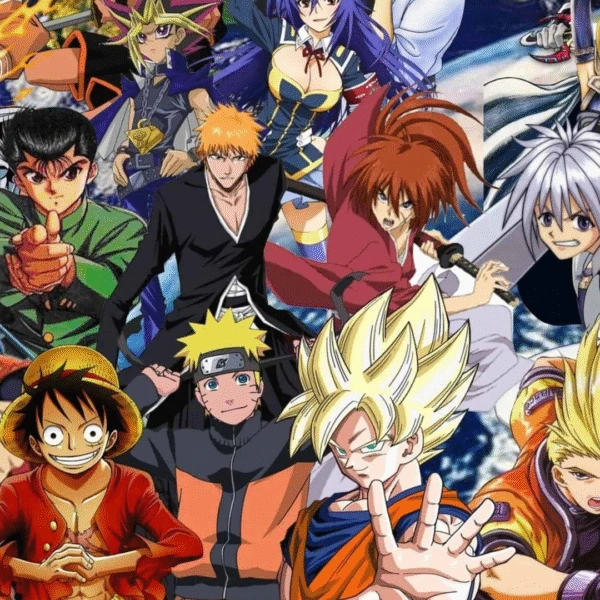
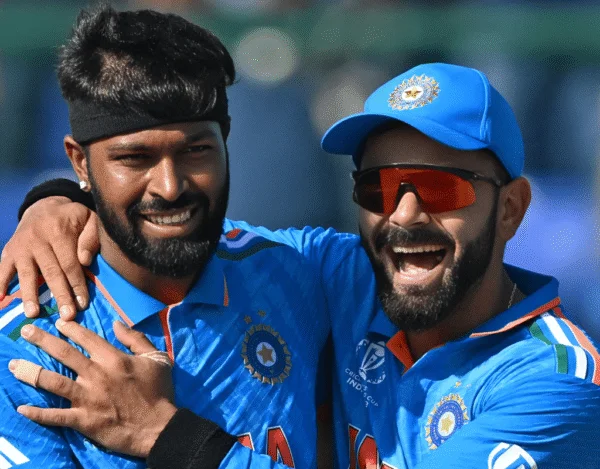

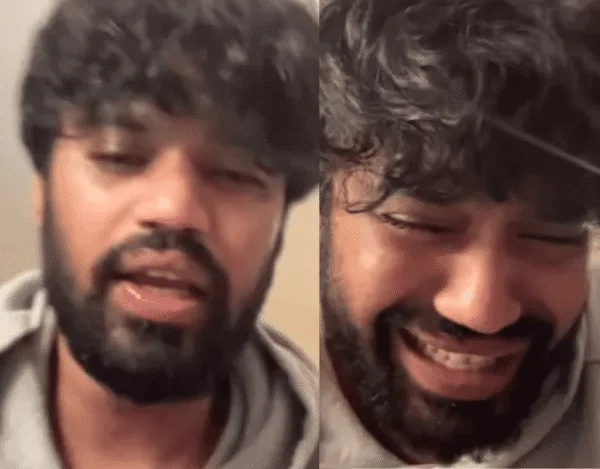









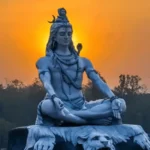




Fxci.Com
I loved as much as you’ll receive carried out right
here. The sketch is tasteful, your authored subject matter stylish.
nonetheless, you command get got an nervousness over that you wish be delivering
the following. unwell unquestionably come further formerly again as exactly the same nearly very often inside case you shield this increase.
https://rostovfeya2.net
Why viewers still make use of to read news papers when in this technological globe all
is accessible on net?
rostovfeya2.net
Good day! This post couldn’t be written any better!
Reading through this post reminds me of my good old room mate!
He always kept talking about this. I will forward this post to him.
Fairly certain he will have a good read. Thanks for sharing!